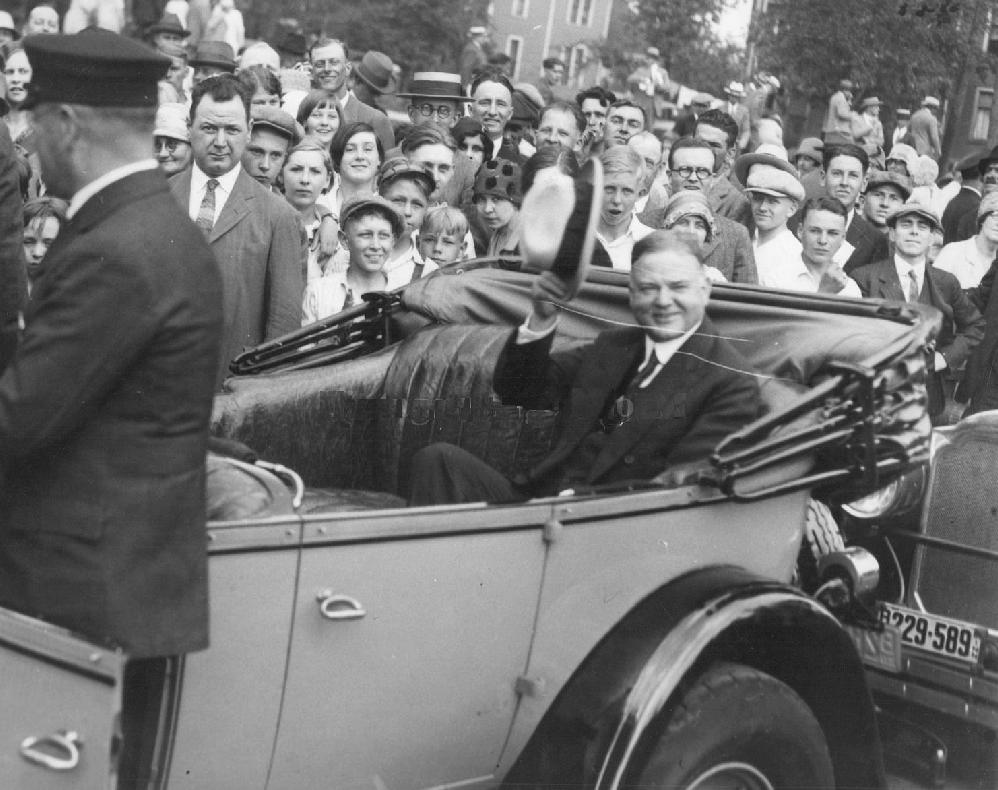
1928 Presidential Election: Campaign

Figure 1.--When Preident Coollidge declined to run again, the Republicans turned to Secretary of Commnerce Herbrt Hoover. Only a year before the Wall Street Crash and Great Depression, it is remarkable that both Hovver, and Al Smith, the Democratic candidate held the same basic economic views. The major issues in the election was prohibition and religion. It was one of dirtiest campaigns in Americn history. Hoover to his credit did not become involved in the mud slinging. Republican partisans and anti-Smith Democrats did. Hoover would be latter derided for comments he made, like, "A chicken in every pot and a car in every garage." Actually he was closer to the truth than most Americans would later belive. The Depression caused by disasterous Governmnt policy, rather than business which Americans came to believe has caused Americans to question capitalism which continues to be a major issue today. This election was between two men who had done emnormous good. Hoover for his humanitarian efforts during and after World War I. Smith for the progressuve legislation he helped enact in New York as govenor. One of the tragedies of democratic politics is how an election between two good men could have turned into such an ugly campaign.
|
|
The Republicans in the early-20th century were the majority party. And short of a split in the Party or a major scandal, the Republicans were the odds on favorite to win the election. Economic prosperity made a Republican victory a virtual foregone conclussion. Secretary Hoover set the tone of the campaign in his acceptance speech, "We in America today are nearer to the final triumph over poverty than ever before in the history of this land... We shall soon with the help of God be in sight of the day when poverty will be banished from this land." Hoover campaigned primarily on economic issues. Hoover's most memorable slogan was "A chicken in every pot [chicken at the time was more expensive than beef] and a car in every garage." The major issues in the campaign, however, became religion and prohibition which is interesting because the United states and the world were on the precupise of economic disaster. Hoover to his credit did not take up the religion issues. The Klan. Protestant. and pro-Prohibition groups did. They charged through tracts and pamphlets that Smith was a drunk and labeled him the 'cocktail president'. And they denounced his Catholic faith as 'the Mother of ignorance, superstition, intolerance and sin. They charged that Gov. Smith was going to make Catholocism the national religion. Fake news is not a new phenomenon. And this was widely believed throughout the Bible belt--the hard core center of the Democratic Party. Little ditties like, "When the Catholics rule the United States, And the Jew grows a Christian nose on his face, When the Pope is the head of the Ku Klux Klan In the land of Uncle Sam Then Al Smith will be our President And the country not worth a damn," were par for the course. Smith did not make a major issue out of prohibition, but it was widely known as opposing it. Hoover wanted it to continue, but argued that there needed to be changes. Smith had achieved progressive reforms in New York, but his conservtive econonmic views mean that even among progessives he did not generate much enthusiasm. And his opposition to prohibition and his Catholcism hurt him badly in the South. Smith campaign strategy was to win his home state with its many electoral votes and put together the solid south with enough other states to win. To ensure a victory in New York he wanted Franklin Roosevelt to run for govenor. Roosevelt was planning his opolitical come back, but reluctant, seeing 1928 as a Republican year. Smith eventually persuaded him. The campaign was notable for the role of radio, For the first time radio was an important force. Radio existed earlier, but by 1928 most Americans had radio sets and radio had reached the big time. Radio and movie newsreels in many ways made this the first truly modern campaign. Smith was gennerally viewed as an excellent campaigner in person. He was known in the Party as the 'Happy Warrior'--a Wordsworth term applied to Smith by Franklin Roosevelt in his nomination speech. Smith did not, however, have a good radio voice nit o mention his New York accent. Here Hoover who was a less effective campaigner in person did better.
CIH

Navigate the Children in History Website:
[Return to the Main U.S. 1928 presidential election page]
[Return to the Main President Collidge page]
[Return to the Main U.S. election page]
[Return to the Main U.S. presidential page]
[Return to the Main U.S. political party page]
[Return to the Main U.S. history page]
[About Us]
[Introduction]
[Biographies]
[Chronology]
[Climatology]
[Clothing]
[Disease and Health]
[Economics]
[Freedom]
[Geography]
[History]
[Human Nature]
[Ideology]
[Law]
[Nationalism]
[Presidents]
[Religion]
[Royalty]
[Science]
[Social Class]
[Bibliographies]
[Contributions]
[FAQs]
[Glossaries]
[Images]
[Links]
[Registration]
[Tools]
[Children in History Home]
Created: 11:25 PM 5/6/2018
Last updated: 11:25 PM 5/6/2018



